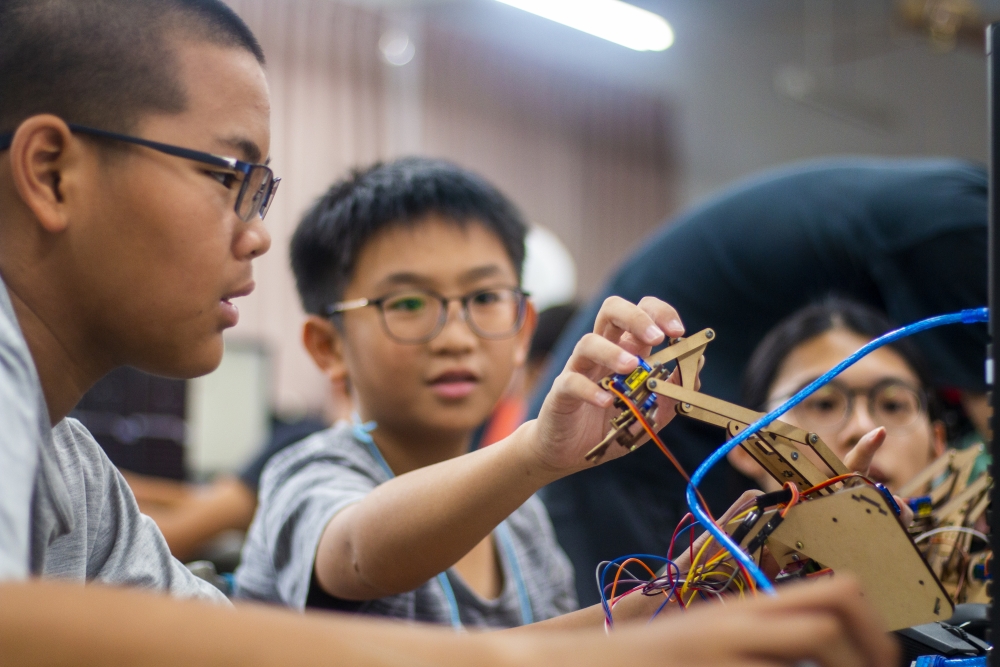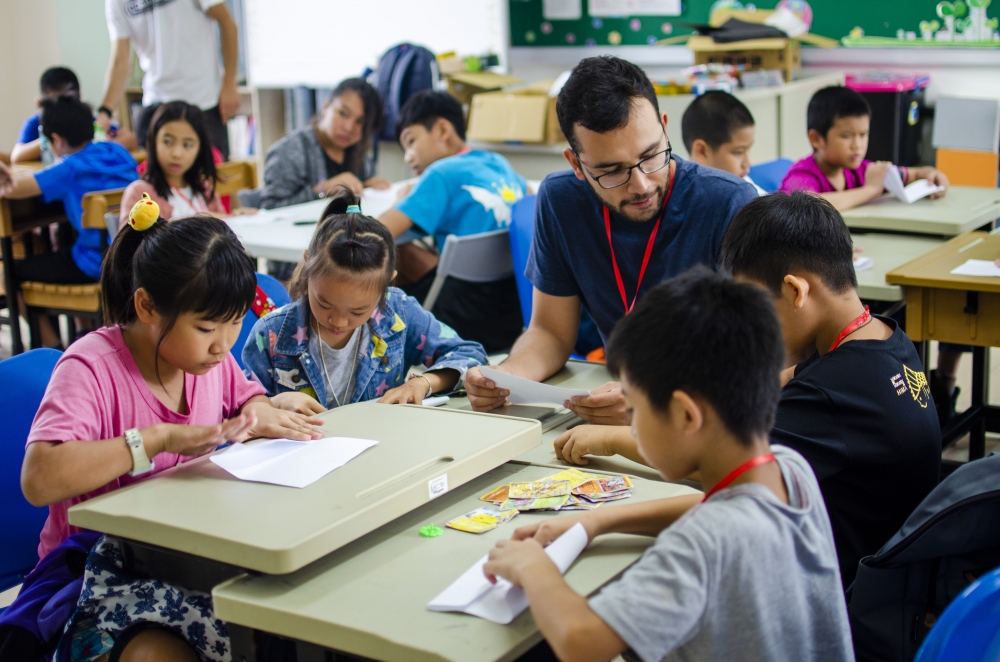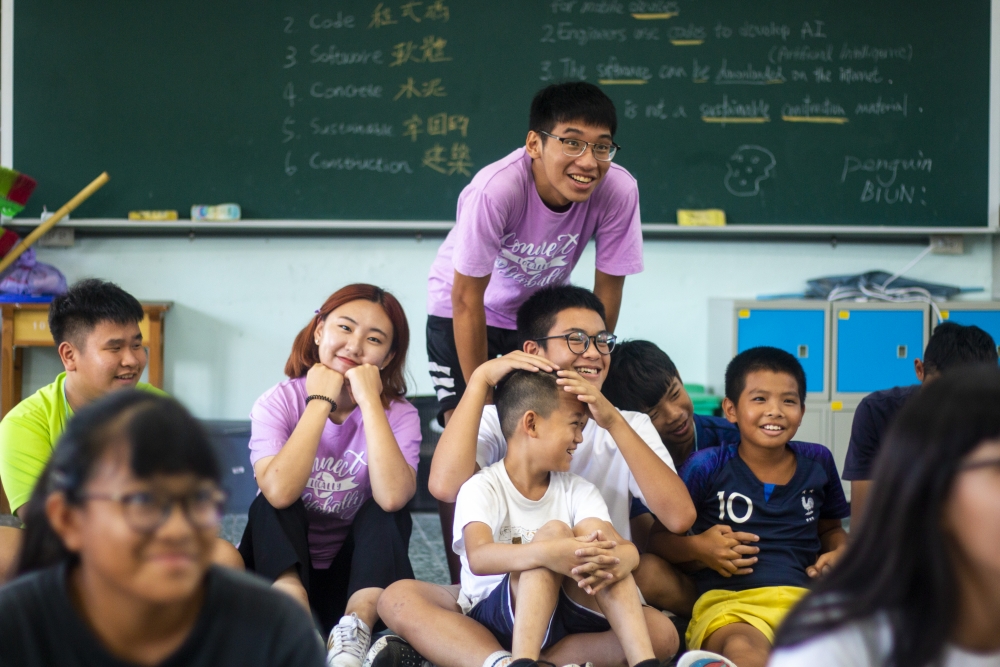Those Who Can, Work Together.
Welcome to the second annual Maker Program volunteer teacher training workshop, the delightful and joyous event that kicked off the 2020 Maker Program held at Chishang Middle School. As a part of an NTUST (National Taiwan University of Science and Technology) Social Responsibility initiative, the year-round program engages volunteers and students in different events and activities that encourage active social practice and cohesion, contributing to the betterment of society. This year brought forth a great start, with high expectations and excitement from participants to bring STEAM (Science, Technology, Engineering, and Mathematics) lessons and activities to Chishang. The STEAM curriculum incorporates the use of technology, allowing children to gain fine motor skills and teaches them to form efficient solutions to real-world problems. The volunteer teachers maintained their enthusiasm throughout the training workshop, even when discussing the tedious 6-hour train ride to the small farming village. Filled with curiosity and anticipation, even this part of the trip was something they looked forward to.
One of the volunteer teachers, Nguyen, however, had a solemn expression. He had left Vietnam in pursuit of different education in Taiwan and was filled with determination to experience this new country in a fulfilling and meaningful way. However, sitting at the table surrounded by his local Taiwanese peers speaking fluent Mandarin Chinese, Nguyen suddenly felt overwhelmed by the language barrier and cultural differences. An hour in, Nguyen told the instructor it was time for him to quit.
His instructor replied, "the two co-captains are Indonesian and Malaysian international students. You can ask them for help."
Nguyen stood there, feeling embarrassed.
"I'll take care of him," said Amy, an NTUST sophomore, as she reached out and took Nguyen under her wing.
Amy was one of the veteran teachers in the Maker Program at Chishang and had her own stories of challenges and embarrassments. Her rookie design based on the STEAM curriculum had been heavily criticized by her peers in the past, and working with an American partner in the Maker Program Summer Intensive had been like a scenario from the movie "Lost in Translation." Amy knew about the challenges and embarrassments, but she had survived through them. "Don't worry too much about speaking Chinese or fitting in," Amy said to Nguyen. "Just focus on the kids and work on earning their trust. They will probably be more focused on the fact that you are a foreigner than on learning how to code. Coding is quite difficult for these first-time learners since it requires some foundational knowledge, and in general, they're usually more interested in chatting and bonding with the volunteer teachers anyway. Children respond better to human interaction, which is why what's important is that you engage them in learning and form a genuine connection with them."
The Project aims to bridge the opportunity gap in different schools in Taiwan, drawing attention to the disparity in access to sustainable, meaningful, and most importantly, diverse, resources of education and social settings. Because of the reform in higher education in Taiwan, universities are being called upon to promote pedagogical innovations and implement student-centered, interdisciplinary, and community-minded service-learning (SL). Hence, volunteer programs led by college students delivering compartmental educational services to underprivileged schools have become extremely popular in university social responsibility (USR). These programs allow students to redefine "service learning"- learning to service and serving to learn. This has been accomplished in recent years, with the rapidly growing STEM-themed camps, which successfully produce instant, tangible, and quantifiable results. However, these camps typically run for short-term and in-between semester breaks, meaning the schools still face sustainability challenges and critical academic outcomes. This raises concerns about the impact of these volunteer programs and the involvement of college students in community change.
This Project involves students following a pre-designed modules-system based both on chronological order and topics with a series of hands-on maker activities for Chishang Middle School and travel for onsite programming. While the goal is to encourage active social practice and cohesion between different groups of age and socio-economic backgrounds, this SL also aims to foster among the college students a strong understanding of and commitment to social engagement. However, when the target schools are located in remote rural areas and the frequency demand for educational resources is high, feasibility problems arise. Participants in this SL intend to address the sustainability challenges and feasibility concerns by way of collaborating with corporate social responsibility (CSR).
The USR + CSR collaboration brings in business professionals as mentors to work alongside with the students through specially designed workshop modules that hone their project management skills. The real-world experiences and practical guidance offered in the workshop modules help equip college students with multitasking, budgeting, scheduling, problem-solving, and critical thinking abilities that are needed to design, execute, and sustain SL, or any future careers. The USR + CSR collaboration, too, provides an opportunity for the businesses to illustrate a more intimate picture of the younger generation and take a look at the potential future employees or team partners.
SL students have been shown in studies across the board to achieve significantly stronger self-efficacy and higher academic performance than non-SL participating students. These findings highlight the effectiveness of SL in providing a more holistic human development. Our Project seeks to expand the conversation surrounding the extended possibilities of SL, and the discussion about USR + CSR collaboration, which aims to rethink the implementation of SL as a key approach for optimizing the quality of university education.
-
University characteristic Startup Stage Project
-
Taipei City
-
National Taiwan University of Science and Technology
Further reading
Measures for Leaving a Message to Enter the Draw for the Live Streaming of the Opening Ceremony
-
Event Period
From 13:00 to 14:00 on December 12 (Saturday), 2020
-
Event Measures
Log in to your personal Facebook or Google account to proceed with leaving a message; each account with a successful message of #2020usrexpo left before the end of the live streaming of the opening ceremony will have an opportunity to enter the draw, and each account is restricted to winning the prize once only.
-
List of Winners
On December 14 (Monday), 2020, the list of winners will be announced on the event official website https://2020usrexpo.org/) Announcement of the list of winners
Event Prize Content
-
1st Prize
“Huei Yeh” Power Extreme Massage Gun 1 winner
-
2nd Prize
Nestle Dolce Gusto Genio 2 1 winner
-
3rd Prize
KINYO Bluetooth 5.0 Wireless Speaker 2 winner
-
4th Prize
7-11 Gift Voucher valued at NT$200 27 winner
Announcement of the list of winners
The various prizes are expected to be notified via email and also announced on the event official website on December 14 (Monday), please will the prize winners pay attention to the prize-winning information, and send back the relevant documents according to the notices & explanations; no separate notification will be issued.
Notices
- The event period for this event is based on Taiwan time, and the delivery of the rewards is restricted to regions including Taiwan, Penghu, Kinmen, and Matsu.
- Please refer to the actual products for the event rewards, the pictures used on the website are for reference only; no request for changing colors, specs, transfers, or cash redemption will be accepted.
- Our event organizer will not be liable for the follow-up warranty and maintenance of the winning rewards; once the rewards have been collected, signed, and accepted, no reissuance of the rewards will be available if the rewards have been lost, peculated, discarded, or damaged. Please refer to the actual products for the prize rewards, no return or exchange will be accepted; the prize winner must contact the manufacturer of the rewards if there is any issue regarding malfunctioning, damage, or maintenance.
- 1st prize ~ 2nd prize (Winning prizes with a value exceeding NT$1,000 (inclusive): Each prize winner should fill out the “Reward Collection Application and Receipt (will be announced together with the announcement of the list of winners)” within 7 days (including holidays based on the post stamp) starting from the next day with the announcement of the list of winners, and must provide a copy of both sides of the ID card. The copy must be sent to the specified place via registered mail; those passing the deadline will be deemed to give up the prize and rights, and no objections will be accepted from the prize winners.
- 3rd Prize ~ 4th Prize (Winning prizes with a value less than NT$1,000 (inclusive): Prize winners should reply to the prize-winning notifying letter via Email within 7 days (including holidays) starting from the next day of the announcement of the list of winners, to confirm the collection of the rewards and to fill out the relevant info for sending the rewards (to confirm the address for sending the gift), and to accelerate the follow-up qualification review. If the prize winners do not complete the relevant info before the deadline, they will be deemed to give up the opportunity to collect the rewards, and no alternative gifts or reissuance of gifts will be available.
- When the prize winners have completed filling out the prize-winning info, the organizer will double-check the identification data of the prize winners, the rewards will only be sent out when all data is correct.
- All prize-winning qualification needs to be approved by the organizer before it becomes effective, all reviewing standards are based on the organizer as the only reference.
- If the prize winner did not fill in the data complete and correct, or cannot be in contact, or did not send back the required data within the announced time of the rewards, the prize winner will then be deemed to voluntarily give up the prize, no separate notification will be announced.
- According to the R.O.C Tax Act, if the prize winner is an individual residing in Taiwan, and the prize amount (value) exceeds NT$1,000 (inclusive), then a copy of both sides of the ID card will need to be handed in for taxation, which will be incorporated into individual income for the annual taxation. If the prize winner is not an individual residing in Taiwan, 20% of reward tax must be deducted from the reward first regardless of the prize amount before the prize winner can collect the reward. If the prize winner is not an adult, a household registration transcript must be provided along with a letter of consent from the legal representative. If the prize winner is unwilling to pay the tax first, he/she will be deemed to give up the reward, and no objections will be accepted.
- If the prize winner is in violation of the relevant event measures or has other dissents, the organizer is allowed to retrieve the reward and no objections from the prize winner will be accepted. If a judicial dispute is involved, all legal liabilities will be held by the individual. The organizer will not be liable.
- If it is confirmed that the participant used a hacker program or other method that evidently violates the fairness of the event in an attempt to influence the event, the organizer is then allowed to disqualify the participant immediately or to cancel the prize-winning qualification. Compensation will be liable if a loss is caused for the organizer due to this.
- For reasons that the organizer are not liable for, including a computer, network, telephone, or technique issues resulting in the delay, loss, incorrect, unidentifiable, or damaged data uploaded by the participants, the organizer will not be liable for any legal liability, and no objections from the participants and prize winners will be accepted.
- The organizer reserves the rights to review the qualification of the event participants, if the organizer or a third party has reported that the participants are found to use methods that are intentional or evidently violate the fairness of the event, or do not conform to the rules of this event, the organizer will then be allowed to cancel the prize immediately.
- The event measures are stated on the event platform, the organizer reserves the right to alter the event details at any time (participating method, gift content and quantity…etc.); the participants must agree completely to follow and obey the alterations of the event without any objection. Please refer to the announcement of the event measures if alternations have been made to the event measures, no separate notification will be available.
- Unmentioned matters of this event should be handled according to the relevant rules of the civil law; the organizer reserves the rights to maintain, modify, cease and explain the content, as well as to cancel the prize-winning qualification of any prize winner influencing other prize winners’ rights. Refer to the announcement on the platform for the modification info; no separate notification will be available.
- Participants in the event agree to accept the event measures and notices, if, in violation, the organizer will then be allowed to cancel the qualification of the participant or the prize winner, and then request the participant for compensation for the losses caused.
- When the event is unable to be conducted due to force majeure causes, the organizer has the rights to cancel, terminate, modify, or cease the event. Participants in the event are deemed to accept the effectiveness of the rules, for unmentioned matters, the organizer reserves the rights to modify, terminate, and alter the event content details without giving out a separate notification.
TOP





